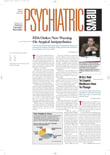I was furious when I first heard the term “funny-looking kid,” or FLK, almost 12 years ago. A rural pediatrician was describing how doctors overlook the possibility of fetal alcohol syndrome (FAS), the physical and neuropsychiatric effects of prenatal alcohol exposure. He said, “They look at the parents and say, `They're pretty funny looking, too. .so, I guess it's genetic.'” My passion for prevention of alcohol-related birth defects has been fueled by such attitudes.
In that spirit of prevention, I co-wrote a recent APA action paper with Dr. Roger Peele, APA's Area 3 trustee, with much guidance from Dr. Kieran O'Malley of the University of Washington's Fetal Alcohol and Drug Unit and assistance from the National Organization on Fetal Alcohol Syndrome (NOFAS). The paper advocates for APA to explore having fetal alcohol-related disorders included in DSM-IV-TR and later editions of the manual. Fetal alcohol spectrum disorder (FASD) is an umbrella term describing the continuum of complex neuropsychiatric, cognitive, behavioral, and physical symptoms associated with all levels of prenatal alcohol exposure.
Currently there is no consistent way for psychiatrists to diagnose FASD, although we are usually the ones to prescribe medications to treat the associated neuropsychiatric sequelae. Pediatric dysmorphologists diagnose FAS, but many pediatricians believe there are no treatments available, so why diagnose the condition?
Lack of standardized psychiatric diagnostic coding prevents families and individuals with FASD from receiving appropriate comprehensive services and results in poor outcomes for those individuals and costly consequences for communities. Early diagnosis has been shown effective in preventing secondary disabilities, such as school failure, juvenile delinquency, mental health problems, homelessness, and unemployability. Individuals with undiagnosed FASD often end up as recidivist clients in institutional settings, including jails, mental health programs, psychiatric hospitals, and homeless shelters.
NOFAS estimates that at least 12,000 children each year are born with FAS, and as many as 36,000 more have alcohol-related neurodevelopment disorder (ARND), a population larger than those with Down syndrome, cerebral palsy, and spina bifida combined. ARND is characterized by neuropsychiatric pathology as severe as that in FAS but without the associated facial features.
From an epidemiologic point of view, the failure to diagnose these disorders results in underreporting and interferes with informing women of childbearing age about the lifelong psychopathology associated with drinking alcohol during pregnancy. The Centers for Disease Control and Prevention reported in 1997 that the rates of women drinking alcohol during pregnancy rose fourfold from 1991 to 1995. This alarming increase may be related to the decline in public-awareness campaigns that occurred just after the 1989 warning label on the dangers of drinking for women who are pregnant or of childbearing age was mandated for alcoholic beverages.
Diagnosis of FASD is a diagnosis for two, ideally ensuring that appropriate systems can be put in place to prevent the mother from having another affected child. Since a majority of physical birth defects occur in the first eight weeks of pregnancy, unintentional early and binge exposures lead to the facial dysmorphology and other malformations associated with FAS. Researchers have demonstrated differences on brain MRIs of children with FAS, such as a thin or missing corpus collosum, hypoplasia of the basal ganglia, and decreased size of the cerebellum. As the quintessential neurobehavioral teratogen, alcohol can affect the embryo and fetus throughout pregnancy. Many neurobehavioral effects are related to second- and third-trimester exposure, when the complex wiring of the central nervous system is occurring.
Unfortunately, alcohol advertising fails to inform adequately about the dangers associated with alcohol use by childbearing-age consumers. The label adopted by the alcohol industry suggests that alcohol should be avoided during pregnancy because of the risk of birth defects, which may occur before a woman knows she is pregnant. Since many pregnancies are unplanned or mistimed, women may unintentionally expose their offspring to alcohol without realizing it. As clinicians, we should be asking appropriate lifestyle screening questions of our patients to provide a way to inform sexually active, childbearing-age alcohol consumers of the risks associated with unintended pregnancy—similar to informing patients about the teratogenicity of certain medications.
As a fellow in child and adolescent psychiatry, I believe it is our duty as psychiatrists to apply our professional knowledge and clinical skills to provide the best care possible for our patients. In this era of advanced technologies, this may mean obtaining a neuroimaging study to look for acquired brain injuries in cases of prenatal exposures. But it is also important for us to practice with passion and conviction that which we came into the field to do.
I feel very fortunate to have found my life's work years ago and to have had mentors along the way to help make a difference. The children are our future, and we must protect them at all cost! ▪

